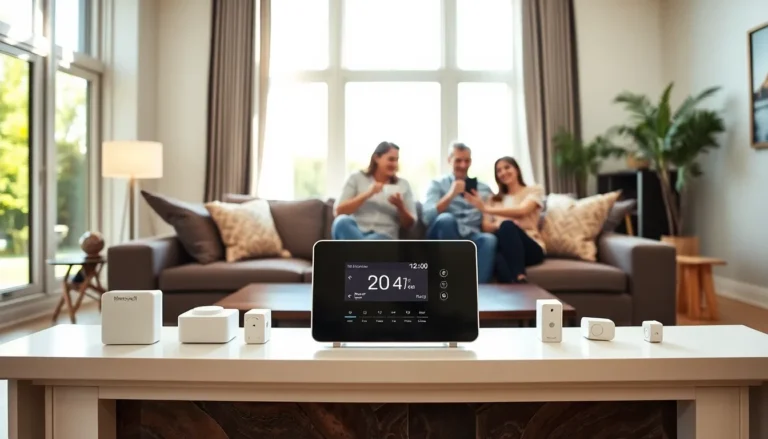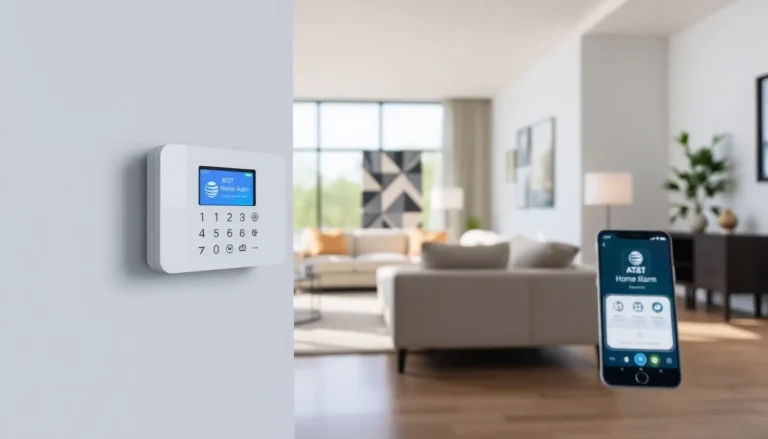Table of Contents
ToggleIn a world where home security is paramount, wired home alarm systems offer peace of mind without breaking the bank. Why pay someone else to do the job when you can channel your inner DIY guru and tackle it yourself? Armed with a little know-how and a few tools, anyone can transform their home into a fortress against unwanted guests.
Imagine installing a system that not only protects your castle but also gives you bragging rights at the next neighborhood barbecue. Plus, it’s a great way to impress your friends with your newfound technical skills. With a wired alarm system, you get reliability and performance that wireless options just can’t match. So roll up those sleeves and get ready to secure your home like a pro—because who wouldn’t want to feel like a secret agent in their own living room?
Overview of Wired Home Alarm Systems
Wired home alarm systems provide a robust solution for enhancing residential security. A wired system connects directly to a power source and uses physical cables to link components like sensors, cameras, and alarms. Such connections often lead to increased reliability, minimizing disruptions caused by signal interference that can affect wireless systems.
Installation of wired systems typically involves less maintenance. Since these systems feature fewer components exposed to potential damage or tampering, they often last longer. Notably, installation requires basic tools and some understanding of electrical systems, making it a feasible option for DIY enthusiasts.
Cost-effectiveness frequently emerges as a significant advantage of wired systems. While upfront installation might seem higher than wireless alternatives, the long-term savings on battery replacements and service fees justify the initial investment. Homeowners often find peace of mind knowing their system’s performance is not reliant on fluctuating battery life.
Performance metrics further highlight the superiority of wired alarm systems. Many systems boast faster response times due to direct connectivity, which leads to quicker notifications during security breaches. Additionally, wiring installations can cover larger areas, providing complete coverage without signal dropouts or weak spots.
Wireless systems often face challenges in areas with thick walls or interferences caused by other devices. In contrast, wired alarm systems excel in these environments, ensuring comprehensive protection for the entire home. With reduced chances of failure, homeowners find that investing time and effort into a wired system yields a consistently effective security solution.
Benefits of Wired Home Alarm Systems Do It Yourself

Wired home alarm systems offer numerous advantages for those aiming to enhance their security with a DIY approach.
Cost-Effectiveness
Cost-effectiveness stands out as a primary benefit. Initial setup costs are typically lower than hiring professionals for installation. Over time, savings on battery replacements and maintenance fees accumulate, further increasing financial benefits. A DIY installation eliminates labor costs while providing a tailored experience. Wired systems often have longer lifespans, reducing the need for frequent upgrades or repairs. This longevity translates to continued savings, emphasizing the value of investment in a wired solution. With no ongoing service fees attached to a self-installed system, homeowners can enjoy enhanced security without straining their budget.
Customization Options
Customization options allow for tailored security setups that meet unique needs. Homeowners gain the flexibility to select components, including sensors, cameras, and alarms based on specific property layouts. A DIY approach empowers individuals to design an alarm system that fits personal preferences and lifestyle. Installing additional features remains easy, whether adding more sensors in high-priority areas or integrating smart home elements. Greater control over the system leads to improved satisfaction with the overall security arrangement. This adaptability ensures that alarm setups can evolve as security needs change, enhancing overall effectiveness.
Installation Process
Installing a wired home alarm system requires strategic planning and proper tools to ensure effectiveness and reliability. A step-by-step approach simplifies the process, making the DIY experience more manageable.
Necessary Tools and Equipment
Gather essential tools before starting the installation. Tools commonly needed include a drill, screwdriver, wire strippers, and a level. Equipment usually required consists of alarm panels, sensors, wiring, and backup batteries. Selecting quality components enhances system performance and longevity, ensuring durable security setups for homes.
Step-by-Step Installation Guide
Begin by mapping out the desired placement for sensors and cameras. Determine locations based on coverage needs and entry points. Next, securely mount the alarm panel in a central area, preferably near existing power outlets. Run cable connections from the panel to each sensor, making sure to avoid high-traffic zones. Connect devices to the alarm panel, ensuring each unit functions correctly through testing. Lastly, program the system following the manufacturer’s instructions to set up alerts and notifications. Successful completion results in a robust home security solution.
Common Features of DIY Wired Alarm Systems
Wired home alarm systems contain several essential features that enhance security and user experience. Understanding these components helps in selecting the right system for individual needs.
Sensors and Detectors
Sensors and detectors form the backbone of any wired alarm system. Motion detectors detect movement in designated areas, providing crucial alerts when there’s potential activity. Door and window sensors trigger alarms when openings are breached, offering direct response to unauthorized access. Glass break sensors add another layer of protection by recognizing the sound of breaking glass. Smoke detectors integrate safety measures by alerting occupants to fire hazards, minimizing risk. Each sensor type promotes a comprehensive approach to home security, ensuring multiple layers of defense against intrusions.
Control Panels and Wiring
Control panels serve as the central hub of wired alarm systems. These user-friendly interfaces allow homeowners to easily manage and monitor their security status. Wiring connects all components, ensuring reliable communication between sensors, alarms, and the control panel. High-quality cables minimize interference and signal loss, maximizing system effectiveness. Homeowners can customize control panel settings, such as alarm volume and notification preferences, enhancing usability. Wiring management is essential for maintaining system integrity and ease of installation, making the process straightforward for DIY enthusiasts.
Maintenance and Troubleshooting
Maintaining a wired home alarm system ensures optimal performance and longevity. Regular checks can prevent minor issues from escalating.
Regular Maintenance Tips
Check sensors monthly for dust or debris. Clean them if necessary to ensure proper functionality. Inspect wiring for signs of wear or damage. Ensure connections are tight and secure. Test the system quarterly to confirm all components work as intended. Replace backup batteries every two to three years, even if they appear functional. Document any maintenance activities to track service history and performance.
Common Issues and Solutions
Occasional false alarms might occur due to improperly installed sensors or low battery power. Correct sensor positioning can resolve most false alarm situations. If the control panel does not respond, check for power supply issues. Reset the panel after ensuring all connections are secure. If any sensors fail to activate, replace them immediately to maintain security integrity. For connectivity problems, verify wiring paths to eliminate disruptions. Addressing these issues promptly protects against potential breaches effectively.
Wired home alarm systems offer a practical and efficient solution for those looking to enhance their security on a budget. By opting for a DIY installation, homeowners not only save money but also gain a sense of accomplishment and control over their security setup. The reliability of wired systems ensures peace of mind, knowing that their home is well-protected against intrusions and hazards.
With customization options available, individuals can tailor their security systems to fit their unique needs and preferences. Regular maintenance and attention to detail during installation can keep these systems running smoothly for years. Investing in a wired alarm system is a smart choice for anyone seeking to bolster their home security while enjoying the satisfaction of a job well done.







